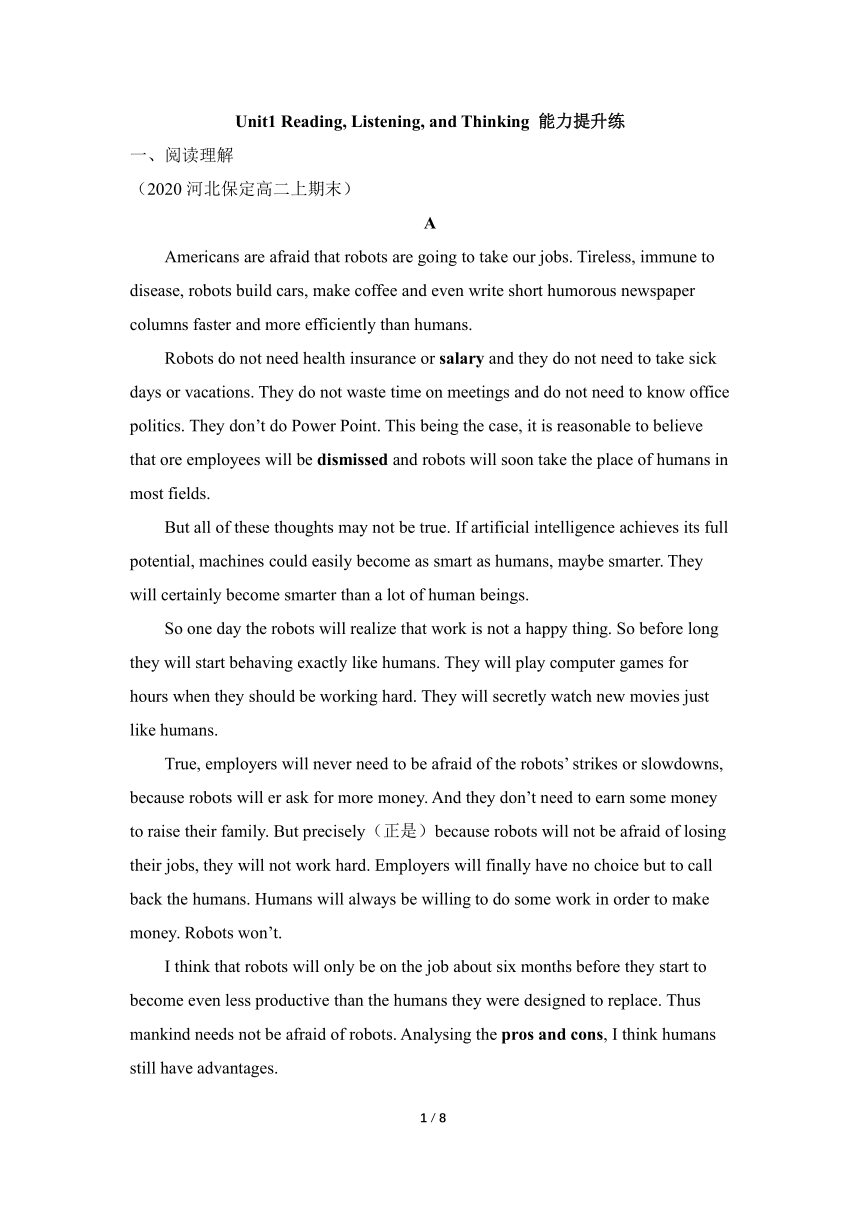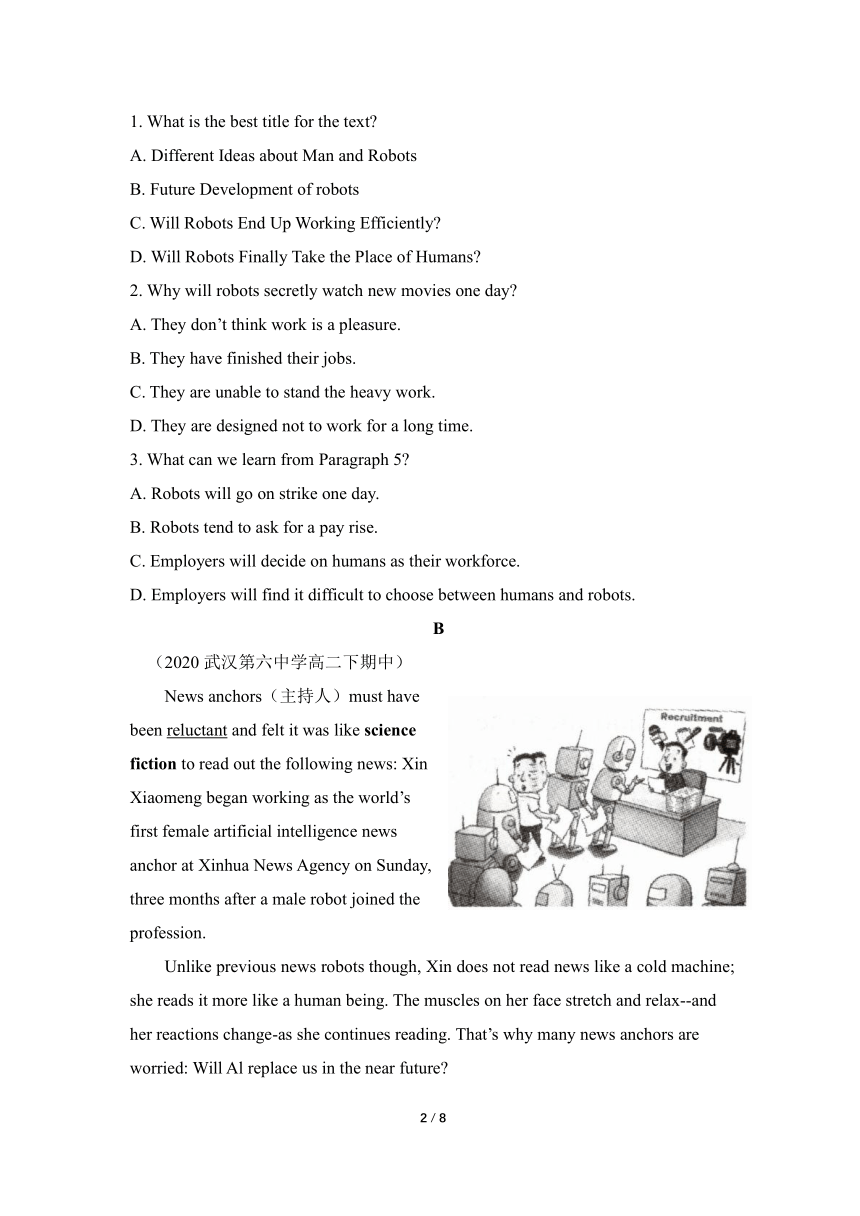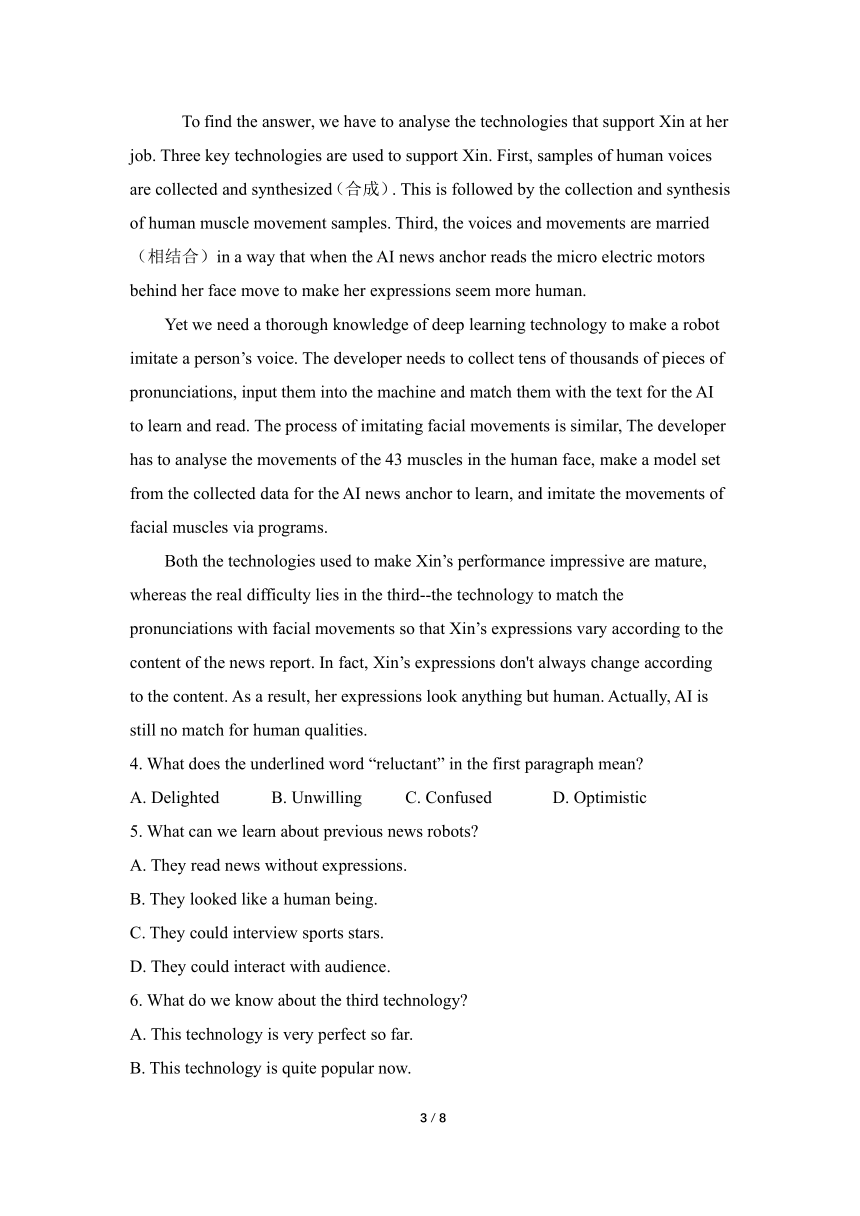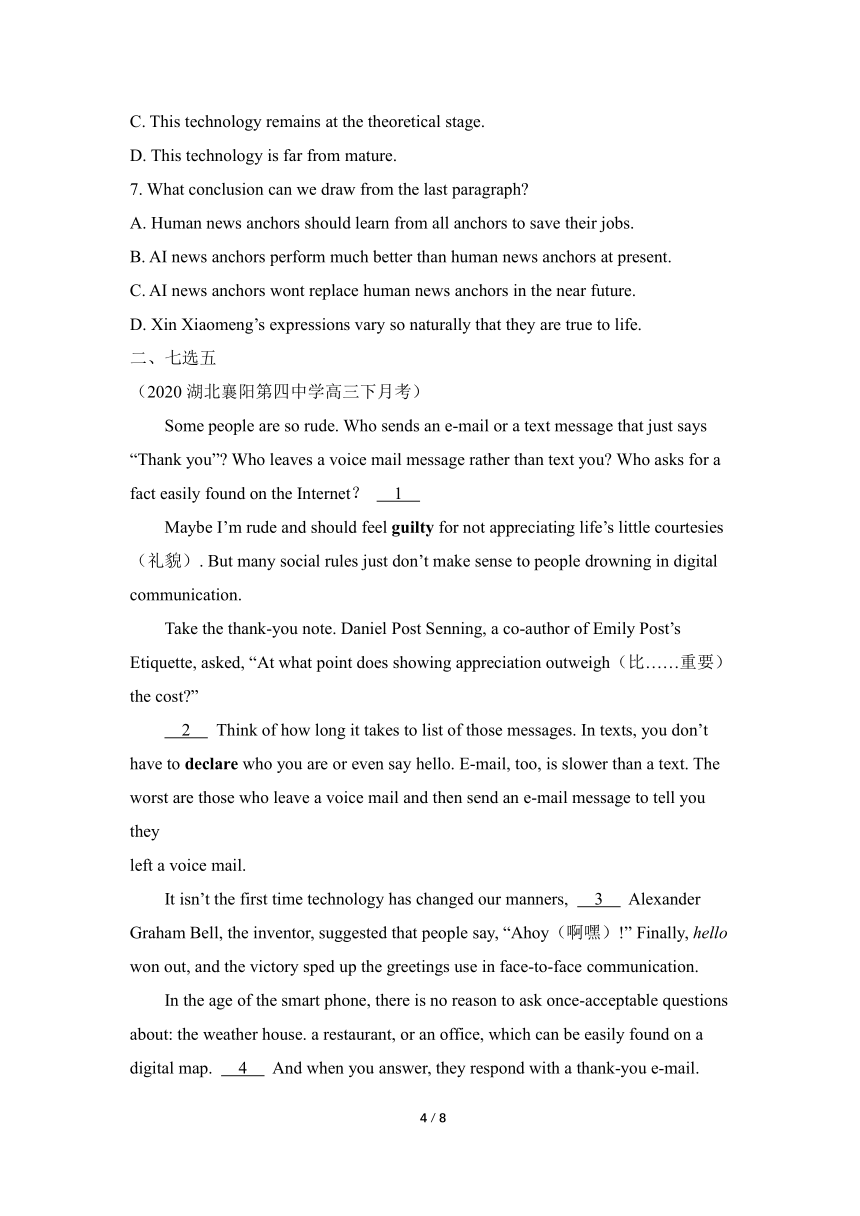人教版(2019)选择性必修第四册 Unit1 Science Fiction Reading,Listening,and Thinking 能力提升练(含解析)
文档属性
| 名称 | 人教版(2019)选择性必修第四册 Unit1 Science Fiction Reading,Listening,and Thinking 能力提升练(含解析) |  | |
| 格式 | docx | ||
| 文件大小 | 216.5KB | ||
| 资源类型 | 教案 | ||
| 版本资源 | 人教版(2019) | ||
| 科目 | 英语 | ||
| 更新时间 | 2023-03-14 07:55:22 | ||
图片预览




内容文字预览
Unit1 Reading, Listening, and Thinking 能力提升练
一、阅读理解
(2020河北保定高二上期末)
A
Americans are afraid that robots are going to take our jobs. Tireless, immune to disease, robots build cars, make coffee and even write short humorous newspaper columns faster and more efficiently than humans.
Robots do not need health insurance or salary and they do not need to take sick days or vacations. They do not waste time on meetings and do not need to know office politics. They don’t do Power Point. This being the case, it is reasonable to believe that ore employees will be dismissed and robots will soon take the place of humans in most fields.
But all of these thoughts may not be true. If artificial intelligence achieves its full potential, machines could easily become as smart as humans, maybe smarter. They will certainly become smarter than a lot of human beings.
So one day the robots will realize that work is not a happy thing. So before long they will start behaving exactly like humans. They will play computer games for hours when they should be working hard. They will secretly watch new movies just like humans.
True, employers will never need to be afraid of the robots’ strikes or slowdowns, because robots will er ask for more money. And they don’t need to earn some money to raise their family. But precisely(正是)because robots will not be afraid of losing their jobs, they will not work hard. Employers will finally have no choice but to call back the humans. Humans will always be willing to do some work in order to make money. Robots won’t.
I think that robots will only be on the job about six months before they start to become even less productive than the humans they were designed to replace. Thus mankind needs not be afraid of robots. Analysing the pros and cons, I think humans still have advantages.
1. What is the best title for the text
A. Different Ideas about Man and Robots
B. Future Development of robots
C. Will Robots End Up Working Efficiently
D. Will Robots Finally Take the Place of Humans
2. Why will robots secretly watch new movies one day
A. They don’t think work is a pleasure.
B. They have finished their jobs.
C. They are unable to stand the heavy work.
D. They are designed not to work for a long time.
3. What can we learn from Paragraph 5
A. Robots will go on strike one day.
B. Robots tend to ask for a pay rise.
C. Employers will decide on humans as their workforce.
D. Employers will find it difficult to choose between humans and robots.
B
(2020武汉第六中学高二下期中)
News anchors(主持人)must have been reluctant and felt it was like science fiction to read out the following news: Xin Xiaomeng began working as the world’s first female artificial intelligence news anchor at Xinhua News Agency on Sunday, three months after a male robot joined the profession.
Unlike previous news robots though, Xin does not read news like a cold machine; she reads it more like a human being. The muscles on her face stretch and relax--and her reactions change-as she continues reading. That’s why many news anchors are worried: Will Al replace us in the near future
To find the answer, we have to analyse the technologies that support Xin at her job. Three key technologies are used to support Xin. First, samples of human voices are collected and synthesized(合成). This is followed by the collection and synthesis of human muscle movement samples. Third, the voices and movements are married(相结合)in a way that when the AI news anchor reads the micro electric motors behind her face move to make her expressions seem more human.
Yet we need a thorough knowledge of deep learning technology to make a robot imitate a person’s voice. The developer needs to collect tens of thousands of pieces of pronunciations, input them into the machine and match them with the text for the AI to learn and read. The process of imitating facial movements is similar, The developer has to analyse the movements of the 43 muscles in the human face, make a model set from the collected data for the AI news anchor to learn, and imitate the movements of facial muscles via programs.
Both the technologies used to make Xin’s performance impressive are mature, whereas the real difficulty lies in the third--the technology to match the pronunciations with facial movements so that Xin’s expressions vary according to the content of the news report. In fact, Xin’s expressions don't always change according to the content. As a result, her expressions look anything but human. Actually, AI is still no match for human qualities.
4. What does the underlined word “reluctant” in the first paragraph mean
A. Delighted B. Unwilling C. Confused D. Optimistic
5. What can we learn about previous news robots
A. They read news without expressions.
B. They looked like a human being.
C. They could interview sports stars.
D. They could interact with audience.
6. What do we know about the third technology
A. This technology is very perfect so far.
B. This technology is quite popular now.
C. This technology remains at the theoretical stage.
D. This technology is far from mature.
7. What conclusion can we draw from the last paragraph
A. Human news anchors should learn from all anchors to save their jobs.
B. AI news anchors perform much better than human news anchors at present.
C. AI news anchors wont replace human news anchors in the near future.
D. Xin Xiaomeng’s expressions vary so naturally that they are true to life.
二、七选五
(2020湖北襄阳第四中学高三下月考)
Some people are so rude. Who sends an e-mail or a text message that just says “Thank you” Who leaves a voice mail message rather than text you Who asks for a fact easily found on the Internet? 1
Maybe I’m rude and should feel guilty for not appreciating life’s little courtesies(礼貌). But many social rules just don’t make sense to people drowning in digital communication.
Take the thank-you note. Daniel Post Senning, a co-author of Emily Post’s Etiquette, asked, “At what point does showing appreciation outweigh(比……重要)the cost ”
2 Think of how long it takes to list of those messages. In texts, you don’t have to declare who you are or even say hello. E-mail, too, is slower than a text. The worst are those who leave a voice mail and then send an e-mail message to tell you they
left a voice mail.
It isn’t the first time technology has changed our manners, 3 Alexander Graham Bell, the inventor, suggested that people say, “Ahoy(啊嘿)!” Finally, hello won out, and the victory sped up the greetings use in face-to-face communication.
In the age of the smart phone, there is no reason to ask once-acceptable questions about: the weather house. a restaurant, or an office, which can be easily found on a digital map. 4 And when you answer, they respond with a thank-you e-mail.
How to handle these different standards Easy: Consider your audience. Some people, especially older ones, appreciate a thank-you message. 5 In traditional societies, the young learn from the old. But in modern societies, the old also lean from the young. Here’s hoping that politeness never goes at of fashion, whereas that time-wasting forms of communication do.
A. Then there is voice mail.
B. Others, like me, want no reply.
C. But people still ask these things.
D. Don’t these people realize that they’re wasting your time?
E. Won’t new technology bring about changes in or daily life
F. Face-to-face communication makes comprehension much easier.
G. When the telephone was invented, people didn’t know how to greet a caller.
1. ________ 2. ________ 3. ________ 4. ________ 5. ________
参考答案
一、阅读理解
A
【语篇导读】本文是一篇议论文。随着人工智能在越来越多的工作中的使用,有人担心机器人会完全取代人类。本篇文章以幽默的语气分析了这一问题。
1. D【解析】主旨大意题。通览全文可知本文首先讲到在工作中机器人越来越多地取代了人类这一现象,这引发人们担心机器人是否会完全取代人类,然后作者以幽默的语气分析了这一问题。由此可知D项“机器人终将会取代人类吗?”最适合做文章标题。
2. A【解析】细节理解题。根据第四段可知,当机器人感觉工作没有乐趣的时候,它们会打游戏或偷偷看电影。故选A
3. C【解析】推理判断题。根据第五段中的 Employers will finally have no choice to make money.可知雇主最终还得让人类重返工作岗位,为了挣钱,人类总是愿意工作的。故选C。
B
【语篇解读】本文是一篇说明文,主要介绍了世界上第一位女性人工智能新闻主播辛晓萌背后的人工智能技术,同时作者指出在近期,人工智能新闻主播不会取代人类新闻主播。
4. B【解析】词义猜测题。根据画线词后内容及第二段中的 That’s why many news anchors are worried: Will AI replace us in the near future?可知,担心将来自己的工作会被人工智能取代的新闻主播一定不愿意看到人工智能新闻主播将在电视台开始工作的消息,由此可知画线词意为“不愿意的”。
5. A【解析】推理判断题。根据第二段中的 Unlike previous news robots though. Xin does not read news like a cold machine. She reads it more like a human being. The muscles on her face stretch and relax--and her reactions change--as she continues reading.可知,与以前的新闻机器人不同的是,辛晓萌播报新闻时不像一台冷冰冰的机器,更像是一个活生生的人,它脸上的肌肉伸展和放松,反应也会发生变化,由此可知,以前的新闻机器人播报新闻时面无表情。
6. D【解析】推理判断题。根据最后一段中的 the real difficulty lies in the third--the technology..As a result,her expressions look anything but human.可知,真正的难点在于第三技术,它使辛晓萌的面部表情根据新闻报道的内容变化而变化。事实上辛晓萌的表情不总是随着内容变化而变化,它的表情一点也不像人类,由此可知,第三技术还远远不够成熟。
7. C【解析】推理判断题。根据最后一段中的 Actually,AI is still no match for human qualities可知,人工智能仍无法与人类的特质相匹敌,由此可知,人工智能新闻主播在不久的将来不会取代人类新闻主播。
二、七选五
【语篇解读】本文是一篇说明文。科技时代新的交流方式冲击了传统礼节,造成了不同人对两者的不同运用。我们要多考虑对方的情况,互相理解,既有礼貌又尽量不浪费别人的时间。
1. D【解析】上文以三个问句的方式表述了:谁给你发邮件或短信仅仅说“谢谢你”?谁给你语音留言而不是发文字给你?谁问一个很容易在网上找到的事实?由此推断D选项“难道这些人没有意识到他们在浪费你的时间吗?符合语境。
2. A【解析】根据后句中的 listen to可以推断空格处的内容和语音信息有关,故A选项符合语境。
3. G【解析】根据Alexander Graham Bell,the inventor, suggested that people say, “Ahoy!” Finally, hello won out可知,空格处描述贝尔刚发明电话时出现了不知道如何打招呼的问题,所以判断G选项“当电话被发明出来后,人们不知道如何和来电者打招呼。”符合语境。
4. C【解析】上文介绍在智能手机时代用数字地图就能解决许多问题;下文提到你帮助他们解决问题后,他们会回复你一封感谢邮件。可知C选项 But people still ask these things.(但人们仍会问这些事情。)承上启下。
5. B【解析】本段介绍不同的人群对礼节有不同的看法。根据Some people, especially older ones, appreciate a thank-you message可知,B选项 Others, like me, want no reply.与之形成对比,指出另一种情况,符合语境。
2 / 2
一、阅读理解
(2020河北保定高二上期末)
A
Americans are afraid that robots are going to take our jobs. Tireless, immune to disease, robots build cars, make coffee and even write short humorous newspaper columns faster and more efficiently than humans.
Robots do not need health insurance or salary and they do not need to take sick days or vacations. They do not waste time on meetings and do not need to know office politics. They don’t do Power Point. This being the case, it is reasonable to believe that ore employees will be dismissed and robots will soon take the place of humans in most fields.
But all of these thoughts may not be true. If artificial intelligence achieves its full potential, machines could easily become as smart as humans, maybe smarter. They will certainly become smarter than a lot of human beings.
So one day the robots will realize that work is not a happy thing. So before long they will start behaving exactly like humans. They will play computer games for hours when they should be working hard. They will secretly watch new movies just like humans.
True, employers will never need to be afraid of the robots’ strikes or slowdowns, because robots will er ask for more money. And they don’t need to earn some money to raise their family. But precisely(正是)because robots will not be afraid of losing their jobs, they will not work hard. Employers will finally have no choice but to call back the humans. Humans will always be willing to do some work in order to make money. Robots won’t.
I think that robots will only be on the job about six months before they start to become even less productive than the humans they were designed to replace. Thus mankind needs not be afraid of robots. Analysing the pros and cons, I think humans still have advantages.
1. What is the best title for the text
A. Different Ideas about Man and Robots
B. Future Development of robots
C. Will Robots End Up Working Efficiently
D. Will Robots Finally Take the Place of Humans
2. Why will robots secretly watch new movies one day
A. They don’t think work is a pleasure.
B. They have finished their jobs.
C. They are unable to stand the heavy work.
D. They are designed not to work for a long time.
3. What can we learn from Paragraph 5
A. Robots will go on strike one day.
B. Robots tend to ask for a pay rise.
C. Employers will decide on humans as their workforce.
D. Employers will find it difficult to choose between humans and robots.
B
(2020武汉第六中学高二下期中)
News anchors(主持人)must have been reluctant and felt it was like science fiction to read out the following news: Xin Xiaomeng began working as the world’s first female artificial intelligence news anchor at Xinhua News Agency on Sunday, three months after a male robot joined the profession.
Unlike previous news robots though, Xin does not read news like a cold machine; she reads it more like a human being. The muscles on her face stretch and relax--and her reactions change-as she continues reading. That’s why many news anchors are worried: Will Al replace us in the near future
To find the answer, we have to analyse the technologies that support Xin at her job. Three key technologies are used to support Xin. First, samples of human voices are collected and synthesized(合成). This is followed by the collection and synthesis of human muscle movement samples. Third, the voices and movements are married(相结合)in a way that when the AI news anchor reads the micro electric motors behind her face move to make her expressions seem more human.
Yet we need a thorough knowledge of deep learning technology to make a robot imitate a person’s voice. The developer needs to collect tens of thousands of pieces of pronunciations, input them into the machine and match them with the text for the AI to learn and read. The process of imitating facial movements is similar, The developer has to analyse the movements of the 43 muscles in the human face, make a model set from the collected data for the AI news anchor to learn, and imitate the movements of facial muscles via programs.
Both the technologies used to make Xin’s performance impressive are mature, whereas the real difficulty lies in the third--the technology to match the pronunciations with facial movements so that Xin’s expressions vary according to the content of the news report. In fact, Xin’s expressions don't always change according to the content. As a result, her expressions look anything but human. Actually, AI is still no match for human qualities.
4. What does the underlined word “reluctant” in the first paragraph mean
A. Delighted B. Unwilling C. Confused D. Optimistic
5. What can we learn about previous news robots
A. They read news without expressions.
B. They looked like a human being.
C. They could interview sports stars.
D. They could interact with audience.
6. What do we know about the third technology
A. This technology is very perfect so far.
B. This technology is quite popular now.
C. This technology remains at the theoretical stage.
D. This technology is far from mature.
7. What conclusion can we draw from the last paragraph
A. Human news anchors should learn from all anchors to save their jobs.
B. AI news anchors perform much better than human news anchors at present.
C. AI news anchors wont replace human news anchors in the near future.
D. Xin Xiaomeng’s expressions vary so naturally that they are true to life.
二、七选五
(2020湖北襄阳第四中学高三下月考)
Some people are so rude. Who sends an e-mail or a text message that just says “Thank you” Who leaves a voice mail message rather than text you Who asks for a fact easily found on the Internet? 1
Maybe I’m rude and should feel guilty for not appreciating life’s little courtesies(礼貌). But many social rules just don’t make sense to people drowning in digital communication.
Take the thank-you note. Daniel Post Senning, a co-author of Emily Post’s Etiquette, asked, “At what point does showing appreciation outweigh(比……重要)the cost ”
2 Think of how long it takes to list of those messages. In texts, you don’t have to declare who you are or even say hello. E-mail, too, is slower than a text. The worst are those who leave a voice mail and then send an e-mail message to tell you they
left a voice mail.
It isn’t the first time technology has changed our manners, 3 Alexander Graham Bell, the inventor, suggested that people say, “Ahoy(啊嘿)!” Finally, hello won out, and the victory sped up the greetings use in face-to-face communication.
In the age of the smart phone, there is no reason to ask once-acceptable questions about: the weather house. a restaurant, or an office, which can be easily found on a digital map. 4 And when you answer, they respond with a thank-you e-mail.
How to handle these different standards Easy: Consider your audience. Some people, especially older ones, appreciate a thank-you message. 5 In traditional societies, the young learn from the old. But in modern societies, the old also lean from the young. Here’s hoping that politeness never goes at of fashion, whereas that time-wasting forms of communication do.
A. Then there is voice mail.
B. Others, like me, want no reply.
C. But people still ask these things.
D. Don’t these people realize that they’re wasting your time?
E. Won’t new technology bring about changes in or daily life
F. Face-to-face communication makes comprehension much easier.
G. When the telephone was invented, people didn’t know how to greet a caller.
1. ________ 2. ________ 3. ________ 4. ________ 5. ________
参考答案
一、阅读理解
A
【语篇导读】本文是一篇议论文。随着人工智能在越来越多的工作中的使用,有人担心机器人会完全取代人类。本篇文章以幽默的语气分析了这一问题。
1. D【解析】主旨大意题。通览全文可知本文首先讲到在工作中机器人越来越多地取代了人类这一现象,这引发人们担心机器人是否会完全取代人类,然后作者以幽默的语气分析了这一问题。由此可知D项“机器人终将会取代人类吗?”最适合做文章标题。
2. A【解析】细节理解题。根据第四段可知,当机器人感觉工作没有乐趣的时候,它们会打游戏或偷偷看电影。故选A
3. C【解析】推理判断题。根据第五段中的 Employers will finally have no choice to make money.可知雇主最终还得让人类重返工作岗位,为了挣钱,人类总是愿意工作的。故选C。
B
【语篇解读】本文是一篇说明文,主要介绍了世界上第一位女性人工智能新闻主播辛晓萌背后的人工智能技术,同时作者指出在近期,人工智能新闻主播不会取代人类新闻主播。
4. B【解析】词义猜测题。根据画线词后内容及第二段中的 That’s why many news anchors are worried: Will AI replace us in the near future?可知,担心将来自己的工作会被人工智能取代的新闻主播一定不愿意看到人工智能新闻主播将在电视台开始工作的消息,由此可知画线词意为“不愿意的”。
5. A【解析】推理判断题。根据第二段中的 Unlike previous news robots though. Xin does not read news like a cold machine. She reads it more like a human being. The muscles on her face stretch and relax--and her reactions change--as she continues reading.可知,与以前的新闻机器人不同的是,辛晓萌播报新闻时不像一台冷冰冰的机器,更像是一个活生生的人,它脸上的肌肉伸展和放松,反应也会发生变化,由此可知,以前的新闻机器人播报新闻时面无表情。
6. D【解析】推理判断题。根据最后一段中的 the real difficulty lies in the third--the technology..As a result,her expressions look anything but human.可知,真正的难点在于第三技术,它使辛晓萌的面部表情根据新闻报道的内容变化而变化。事实上辛晓萌的表情不总是随着内容变化而变化,它的表情一点也不像人类,由此可知,第三技术还远远不够成熟。
7. C【解析】推理判断题。根据最后一段中的 Actually,AI is still no match for human qualities可知,人工智能仍无法与人类的特质相匹敌,由此可知,人工智能新闻主播在不久的将来不会取代人类新闻主播。
二、七选五
【语篇解读】本文是一篇说明文。科技时代新的交流方式冲击了传统礼节,造成了不同人对两者的不同运用。我们要多考虑对方的情况,互相理解,既有礼貌又尽量不浪费别人的时间。
1. D【解析】上文以三个问句的方式表述了:谁给你发邮件或短信仅仅说“谢谢你”?谁给你语音留言而不是发文字给你?谁问一个很容易在网上找到的事实?由此推断D选项“难道这些人没有意识到他们在浪费你的时间吗?符合语境。
2. A【解析】根据后句中的 listen to可以推断空格处的内容和语音信息有关,故A选项符合语境。
3. G【解析】根据Alexander Graham Bell,the inventor, suggested that people say, “Ahoy!” Finally, hello won out可知,空格处描述贝尔刚发明电话时出现了不知道如何打招呼的问题,所以判断G选项“当电话被发明出来后,人们不知道如何和来电者打招呼。”符合语境。
4. C【解析】上文介绍在智能手机时代用数字地图就能解决许多问题;下文提到你帮助他们解决问题后,他们会回复你一封感谢邮件。可知C选项 But people still ask these things.(但人们仍会问这些事情。)承上启下。
5. B【解析】本段介绍不同的人群对礼节有不同的看法。根据Some people, especially older ones, appreciate a thank-you message可知,B选项 Others, like me, want no reply.与之形成对比,指出另一种情况,符合语境。
2 / 2
